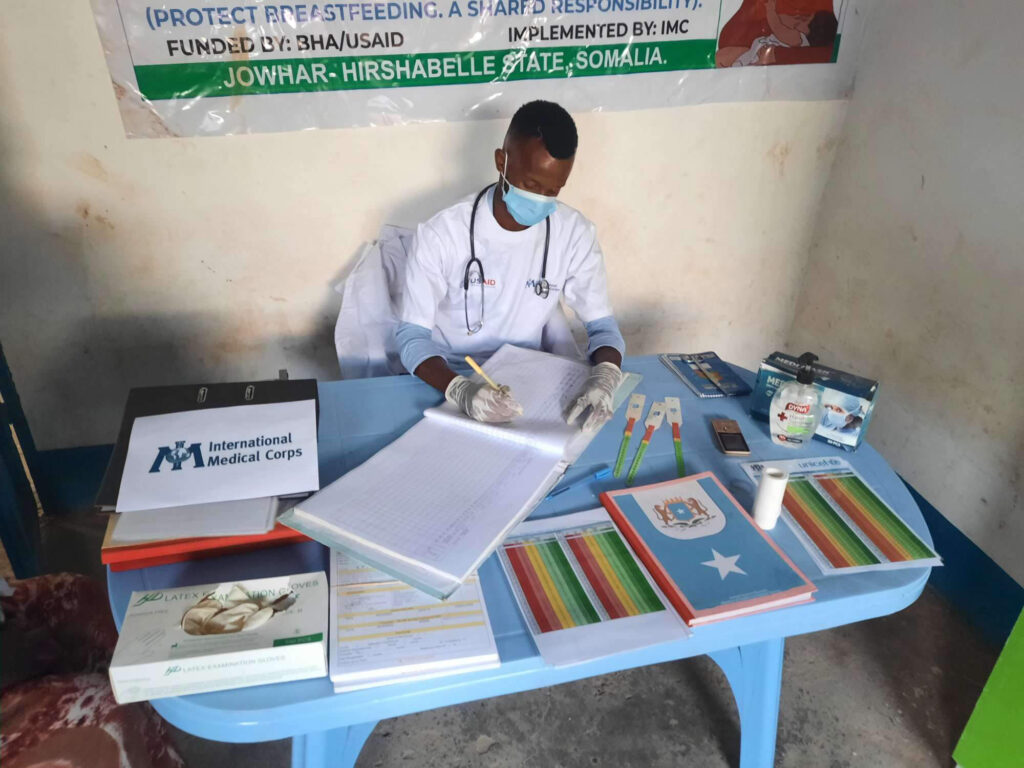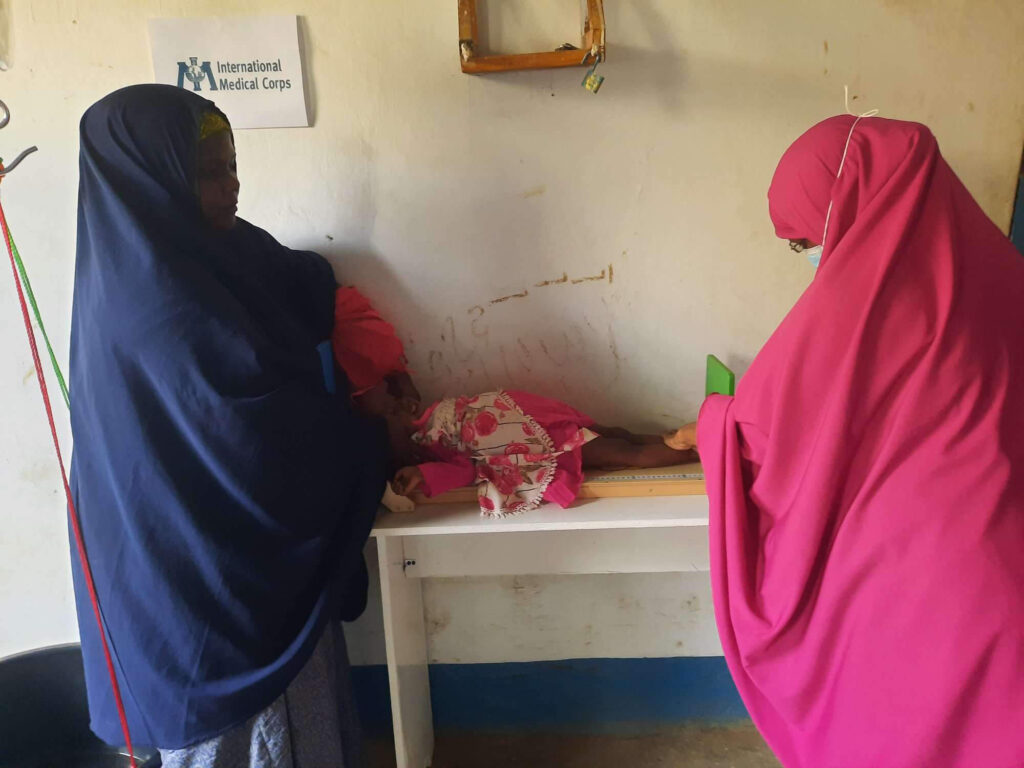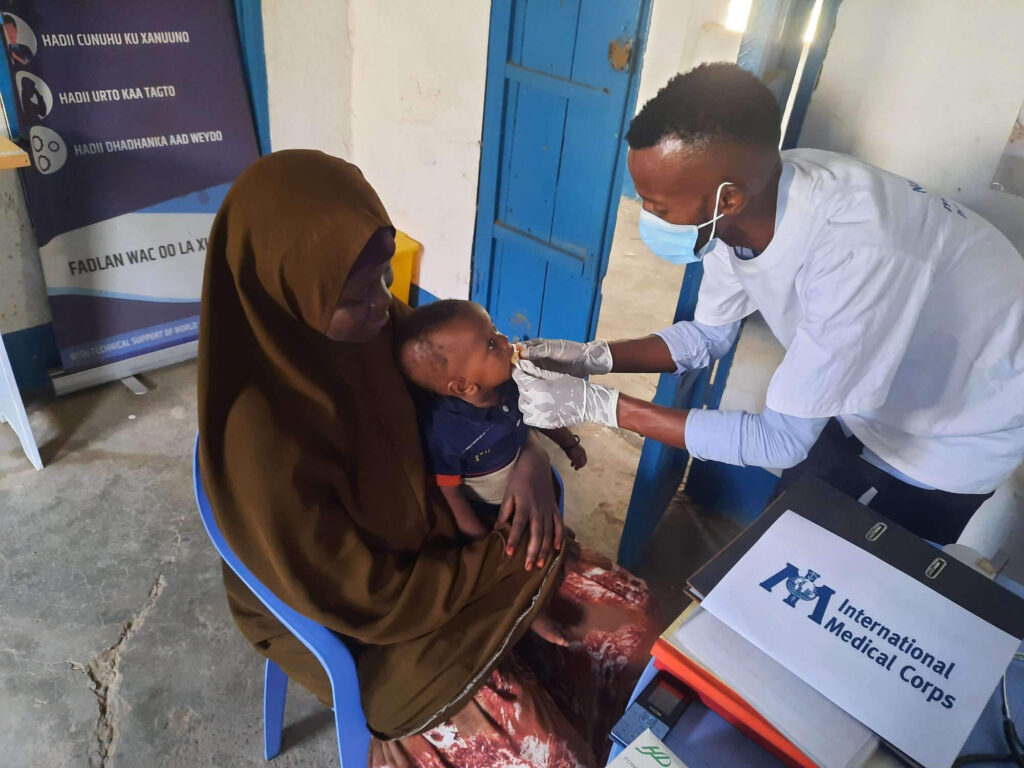Sixteen-month-old Halimo Said Bashiir lives with her parents and four siblings at the Sheikh Omar camp for internally displaced persons (IDPs). Originally from Afgooye in the Lower Shebelle region of Somalia, Halimo’s family was forced to move to the IDP camp due to security concerns. With this move, her family fell on hard times, since her parents were unemployed and worked as day laborers. With meager pay that wasn’t always forthcoming, they often found it difficult to meet the nutritional needs of their growing children—they could only afford porridge and milk with the money they earned.
In October 2021, Halimo began receiving treatment for moderate acute malnutrition (MAM) at the International Medical Corps-supported Kulmis Health and Nutrition Facility in Jowhar.

Halimo’s mother, 25-year-old Ruqiyo Haji, admits that she only learned of her daughter’s deteriorating health during a routine house-to-house health screening visit by a female health worker (FHW) from Kulmis Health Facility. “When the FHW came to our home, she asked me a few questions about my children and requested to screen those between 6 and 59 months to monitor their nutritional status,” Ruqiyo explained. “I brought my son Hanad and my daughter Halimo for the tests. Fortunately, Hanad was okay. However, the FHW confirmed that Halimo was malnourished, gave me a referral sheet and asked me to visit Kulmis Health Facility for a final assessment.”
Ruqiyo took her daughter to the facility, less than two kilometers (1.2 miles) from their home. The nurses screened Halimo extensively, noting her medical history and giving her a physical examination. They took Halimo’s mid-upper arm circumference (MUAC) measurements, along with her weight and height, to determine her nutritional status. She was diagnosed with MAM, after meeting the admission criteria with a MUAC measurement of 12 cm (4.7 in). She and was admitted to the targeted supplementary feeding program (TSFP) to receive appropriate treatment.
Halimo’s Road to Recovery
After receiving treatment and nutritional support for 71 days, Halimo met the discharge criterion with a MUAC above 12.5 cm (4.9 in). Additionally, her body weight had increased from 7 kg (15 lbs) to 8.2 kg (18 lbs). She was discharged from the program and began having biweekly visits so that nutrition staff could continue to monitor her nutritional status and provide her with ready-to-use supplementary food packets to ensure her full recovery and prevent relapse.
Ruqiyo also benefited from several nutrition training and counseling sessions designed to equip mothers and caregivers with tools to prevent malnutrition. While at the Kulmis health facility, Ruqiyo received maternal, infant and young-child nutrition counseling, and joined other caregivers for training on the Family MUAC initiative—an alternative screening approach that helps the community detect acute malnutrition early and gives mothers the opportunity to be actively involved in their children’s health and nutrition status.

Ruqiyo was also trained on proper breastfeeding technique and how to prepare nutritious meals for her children using locally available ingredients. And she received training on proper handwashing, water storage and food storage, to prevent other illnesses.
Following her daughter’s remarkable improvement, Ruqiyo was elated and thanked the team for their assistance in Halimo’s recovery. “I am a very proud mother,” she said. “I was worried about my daughter, but I am now happy to see her in good health. I have very high hopes for Halimo, and I know she has a bright future ahead of her and that she will contribute greatly to our family, people in this society and her country.”
She also acknowledged International Medical Corps’ role in supporting health at the Kulmis health facility. “Since I moved to the Sheikh Omar IDP Camp, my family and I always seek medical care at the Kulmis health facility,” she said. “I am very familiar with International Medical Corps. I am pleased with their staff at the facility, as they are always professional and treat us well despite our background.”
